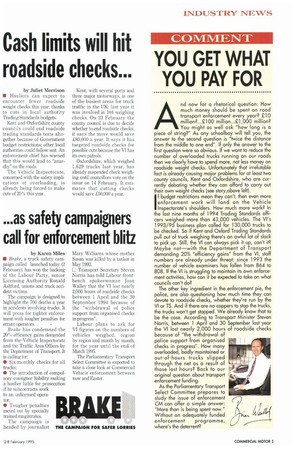YOU GET WHAT YOU PAY FOR
Page 7

If you've noticed an error in this article please click here to report it so we can fix it.
And now for a rhetorical question: How much money should be spent on road transport enforcement every year? £10 million?...£100 million...£1,000 million? You might as well ask "how long is a piece of string?" As any schoolboy will tell you, the answer to the second question is "twice the distance from the middle to one end". If only the answer to the first question were so obvious, If we want to reduce the number of overloaded trucks running on our roads then we clearly have to spend more, not less money on roadside weight checks. Unfortunately that irrefutable fact is already causing major problems for at least two county councils, Kent and Oxfordshire, who are currently debating whether they can afford to carry out their own weight checks (see story,above left). If budget restrictions mean they can't, then even more enforcement work will land on the Vehicle Inspectorate's shoulders. How much more work? In the last nine months of 1994 Trading Standards officers weighed more than 43,000 vehicles. The VI's 1993/95 business plan called for 130,000 trucks to be checked. So if Kent and Oxford Trading Standards pull out of truck weighing there's an awful lot of slack to pick up. Still, the VI can always pick it up, can't it? Maybe not—with the Department of Transport demanding 20% "efficiency gains" from the VI, staff numbers are already under threat: since 1993 the number of vehicle examiners has fallen from 864 to 808. If the VI is struggling to maintain its own enforcement activities, how can it be expected to take on what councils can't do?
The other key ingredient in the enforcement pie, the police, are also !questioning how much time they can devote to roadside checks, whether they're run by the VI or TS. And if there are no coppers to stop the trucks, the trucks won't get stopped. We already know that to be the case. According to Transport Minister Steven Norris, between 1 April and 30 September last year the VI lost nearly 2,000 hours of roadside checks because of "the withdrawal of police support from organised checks in progress". How many overloaded, badly maintained or out-of-hours trucks slipped through the net as a result of those lost hours? Back to our original question about transport enforcement funding.
As the Parliamentary Transport Select Committee prepares to study the issue of enforcement CM can offer a simple answer: "More than is being spent now." Without an adequately funded enforcement programme, where's the deterrent?
































































































